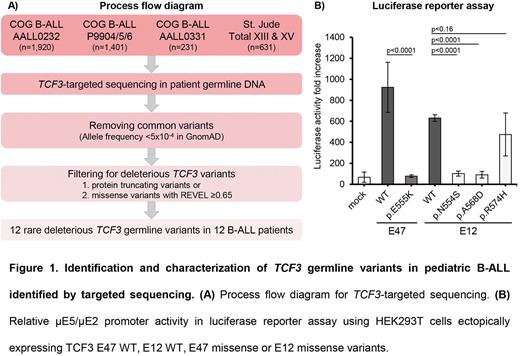Abstract

Introduction TCF3 is a hematopoietic transcription factor essential for lymphoid differentiation. The role of TCF3 in the pathogenesis of B-cell acute lymphoblastic leukemia (B-ALL) is well documented because of recurrent chromosomal rearrangements leading to TCF3 fusion with PBX1 or HLF1. In contrast, less is known about the occurrence and significance of germline TCF3 variants in this blood cancer. Here we present a comprehensive screen and characterization of TCF3 germline variants in children with B-ALL.
Methods First, we performed targeted sequencing of TCF3 coding regions in 4,183 children with newly diagnosed B-ALL enrolled in Children's Oncology Group (COG) clinical trials AALL0232, P9904/5/6, and AALL0331 as well as St. Jude Total Therapy XIII and XV clinical trials. Rare variant analysis was performed using the CoCoRV pipeline (Chen W et al., Nat Commun. 2022, PMID: 35545612), where the GnomAD v2 genome-based summary counts (n=15,708) were used as the non-ALL control cohort. Rare deleterious TCF3 variants were defined as follows: allele frequency ≤5x10-4 in GnomAD, protein-truncating variants (frameshift and nonsense) or missense variants with a REVEL score ≥0.65. For transcription factor activity measurement, we used a dual-luciferase reporter assay in HEK 293T cells. Finally, we compared the clinical characteristics of B-ALL patients with rare deleterious TCF3 germline variants to B-ALL patients without these variants enrolled in COG AALL0232 (n=2,180) and COG P9904/5/6 (n=1,619) clinical trials.
Results TCF3 alternative splicing gives rise to two distinct isoforms, E47 and E12, of which we found TCF3-E12 to be the predominant transcript expressed in B-ALL. Focusing our analysis on the E12 isoform (NM_003200), we identified 12 rare deleterious TCF3 variants in 12 B-ALL patients, significantly and strikingly more frequent than what is seen in non-ALL controls (p=1.24×10-5, OR=19.9) (Figure 1A). Nine TCF3 variants lead to protein truncation with the loss of the basic helix-loop-helix (b-HLH) domain and three missense variants cluster within TCF3 exon 18a, which encodes the b-HLH domain that is responsible for TCF3 dimerization and DNA binding.
Functional characterization by luciferase reporter assay revealed a severe reduction of TCF3 transcriptional activity for two B-ALL-related missense variants. TCF3 E12-p.N554S and E12-p.A568D showed a 6.2- (p<0.0001) and 6.9-fold (p<0.0001) reduction in transcription factor activity compared to wildtype TCF3 E12 (Figure 1B). TCF3 E47-p.E555K is a known loss of function variant and therefore was included as a positive control. As expected, its transcription factor activity was reduced by 11.8-fold compared to wildtype TCF3 E47 (p<0.0001). These results are consistent with the notion that single nucleotide variations within the b-HLH domain impair TCF3 dimerization and DNA binding. Nonsense and frameshift variants result in the loss of the b-HLH domain and were presumed to be deleterious.
Finally, we compared clinical features of 10 TCF3 germline variant carriers to 3,799 B-ALL patients without TCF3 variation enrolled in COG clinical trials. We did not observe any difference in age, sex, ancestry, or white blood count at diagnosis. Further, none of the 10 patients with TCF3 germline variant had somatic fusion genes involving TCF3 (i.e., TCF3-PBX1 or TCF3-HLF1).
Conclusion We systematically examined germline genetic variants in the TCF3 gene in B-ALL patients, reporting 12 rare deleterious TCF3 variants with a cumulative frequency of 0.29%. These variants directly affect the TCF3 b-HLH domain, which is critical for TCF3 transcription factor activity. Taken together, our findings provide new insights into genetic predisposition to pediatric B-ALL.
Disclosures
Teachey:BEAM Therapeutics: Consultancy; Sobi: Consultancy. Raetz:Pfizer: Research Funding; BMS: Other: Data and Safety Monitoring Board. Pui:Novartis: Other: Data monitoring committee; Adaptive Biotechnologies: Membership on an entity's Board of Directors or advisory committees. Hunger:Amgen: Current equity holder in private company; Amgen: Honoraria; Jazz: Honoraria; Servier: Honoraria. Yang:Takeda: Research Funding.
Author notes
 This icon denotes a clinically relevant abstract
This icon denotes a clinically relevant abstract
Asterisk with author names denotes non-ASH members.


